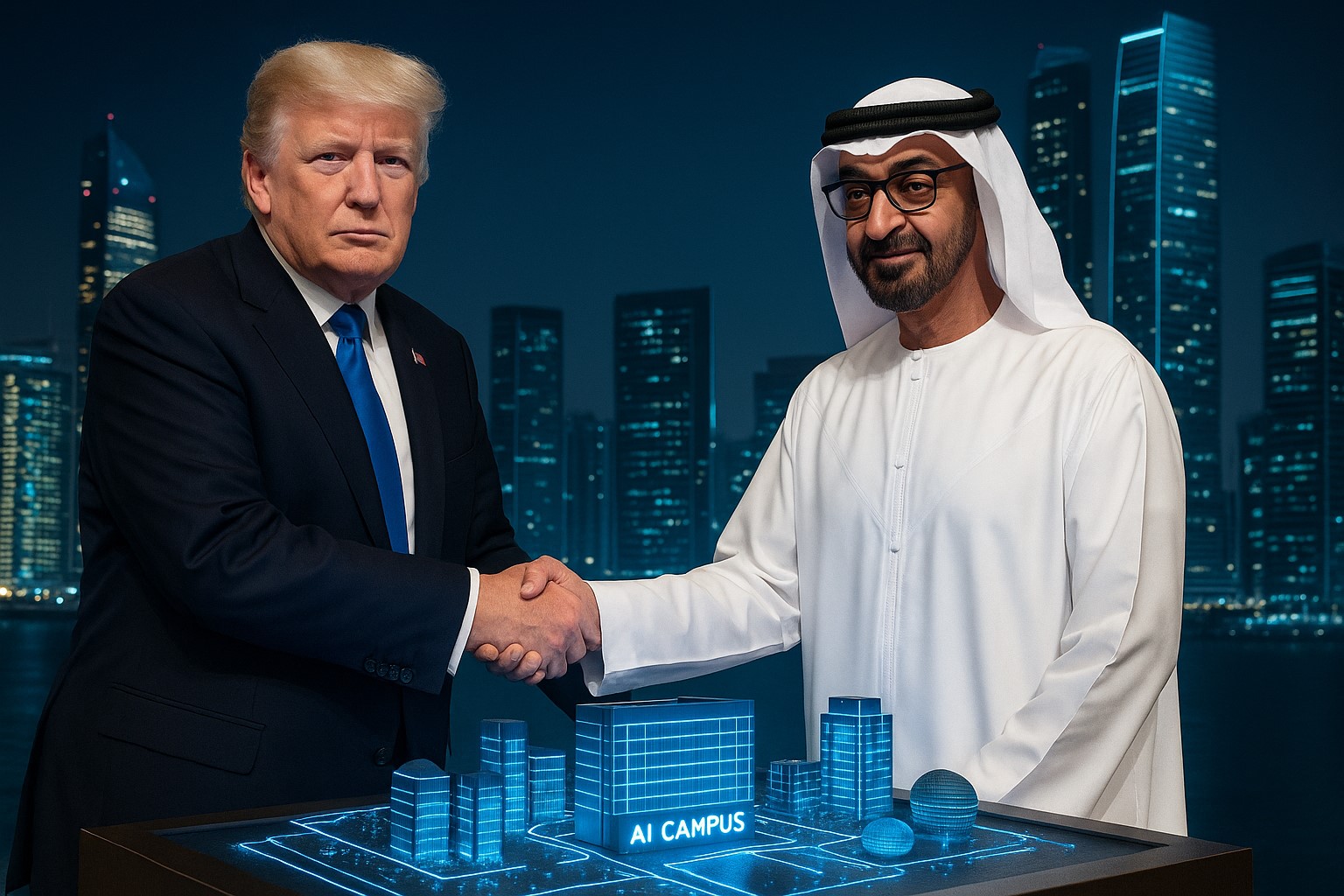Technology
Trump’s UAE Visit Sparks AI Megadeal: Gulf Emerges as Global AI Power

When Donald Trump touched down in the United Arab Emirates (UAE) earlier this year, the spotlight was not just on diplomatic fanfare but on a sweeping technological pact that could reshape the region’s economic future. The centerpiece of the visit was the unveiling of a vast new AI campus — a joint UAE-US initiative billed as the largest artificial intelligence infrastructure hub outside the United States.
The announcement marked the Gulf’s boldest step yet toward becoming a global hub for artificial intelligence, positioning itself at the crossroads of energy, finance, and cutting-edge technology.
US-UAE AI Campus: A Strategic Milestone
During his state visit, Trump joined UAE President Sheikh Mohamed bin Zayed Al Nahyan to unveil a model of the AI campus. Backed by billions in Emirati investment and supported by major US tech firms, the initiative reflects how deeply Washington now views AI as a pillar of its alliances in the Middle East.
The campus is part of the multibillion-dollar “Stargate” project, funded by G42, a state-linked Emirati technology powerhouse. Nvidia will provide its most advanced chips, while Cisco, Oracle, Japan’s SoftBank, and other global partners are contributing to the infrastructure.
Hassan Alnaqbi, CEO of Khazna, the UAE’s largest data center operator and majority owned by G42, said:
“Just like Emirates turned the UAE into a global hub for air travel, now the country can become an AI and data hub.”
Khazna is spearheading the construction of the new data center cluster, adding to its already vast network of 29 facilities across the UAE.
Compute Is the New Oil
In the 20th century, Gulf oil powered global industry. In the 21st century, Gulf leaders say compute power is the new fuel.
“Compute is the new oil,” explained Mohammed Soliman, senior fellow at the Middle East Institute. He argues that just as petroleum once sustained the global economy, tomorrow’s prosperity will depend on access to chips, data centers, and high-performance infrastructure.
This vision is driving Saudi Arabia and the UAE to pour billions into AI infrastructure. Saudi Arabia’s Public Investment Fund (PIF) has launched Humain, a new national AI company that plans to deploy hundreds of thousands of Nvidia chips over the next five years.
Meanwhile, Abu Dhabi’s Mubadala has backed G42 and MGX, a $100 billion AI joint venture with Microsoft, alongside other local initiatives designed to entrench the region as an AI hub.
From Investors to AI Power Players
For years, Gulf sovereign wealth funds quietly invested in global technology companies. Now, they are shifting from passive investors to active builders of AI infrastructure at home.
By establishing large-scale data centers and attracting global firms like OpenAI, the Gulf states are positioning themselves as indispensable partners in the global AI supply chain.
The UAE, leveraging its strategic location between Europe and Asia, low taxes, and regulatory flexibility, is working to attract world-class AI talent. Long-term visas and government-backed incentives are central to these efforts.
However, challenges remain. The UAE’s small population, just over 10 million, limits its homegrown research base. The region has yet to produce an AI company with the global profile of OpenAI, Mistral, or DeepSeek.
Geopolitics: AI and the US-China Rivalry
The UAE’s push into AI is not just about economics; it is also about geopolitics. Trump’s visit to the Gulf coincided with the White House easing restrictions on exporting Nvidia’s most powerful chips to the UAE and Saudi Arabia.
The move is part of a broader strategy to counter China’s growing influence. Gulf nations, once heavily reliant on Huawei and Chinese-backed digital infrastructure, are now aligning themselves more closely with Washington’s technology ecosystem.
According to experts, the AI agreements reached during Trump’s trip are less about the Gulf itself and more about reinforcing the US-led “AI stack” — the combination of chips, data centers, software, and models dominated by American companies.
“Bringing the Gulf into the American AI stack ensures the region is on Team America,” Soliman noted.
China Still Looms Large
Despite Washington’s lead, analysts caution against underestimating China’s capabilities. While American chips and AI models remain the most advanced, China’s offerings are cheaper and “good enough” for many countries seeking AI adoption at scale.
For now, however, the Gulf’s pivot toward US-backed AI partnerships signals a decisive bet. As investor Baghdad Gherras said, “At this stage the Americans are ahead in the AI game. So, it made sense for the UAE to bet on them.”
Conclusion: A New Era for Gulf Economies
Trump’s UAE visit highlighted a historic turning point: the Gulf’s transition from oil dependency to becoming a cornerstone of the global AI economy. With billions flowing into infrastructure, sovereign wealth funds backing new ventures, and partnerships with US technology giants, the region is rapidly positioning itself as a critical hub in the global AI race.
For Washington, the alliance helps cement its lead in the technology contest with China. For the Gulf, it represents nothing less than the chance to replace oil with compute as the foundation of its economic power.
As the Stargate project and other AI ventures move forward, the world will soon find out whether the Gulf can replicate its oil-era dominance in the age of artificial intelligence.

